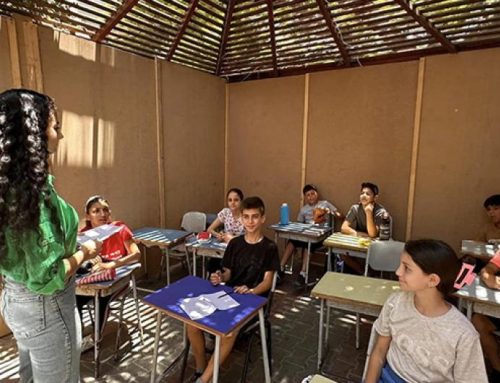I started reading The Washington Post regularly when I was in high school. It’s been sort of a “local paper†for me for many years. Thus it was very natural when I first moved to Jerusalem to bookmark the Post on my Web browser and to check in almost every day.
I started reading The Washington Post regularly when I was in high school. It’s been sort of a “local paper” for me for many years. Thus it was very natural when I first moved to Jerusalem to bookmark the Post on my Web browser and to check in almost every day. I would read a variety of entries from local news to sports to comics to editorials, but what I looked for the most were the articles and items regarding the Palestinian-Israeli conflict. For the most part I was satisfied that the newspaper was providing pretty balanced coverage, at least when it provided coverage at all. It was gratifying when, during my first year there, the Post published a front-page series on the Separation Wall. The articles presented both the Israeli justification for the barrier on the basis of “security concerns,” as well as the excesses of confiscation of Palestinian land and water and the devastating effect it was beginning to have on life for the entire Palestinian population.
Upon our arrival back in the United States not only did I continue this deeply ingrained reading habit, but I was able to hold an actual newspaper in my hands!
In Jerusalem I could read an article and my mind would fill in the blanks and flesh out the nuances. In addition most of my colleagues and friends would fashion the same mental modifications. We were able to do so, because we were living in the situation—experiencing the realities of the occupation daily and surrounded by a host of other sources of information. Without even thinking about it we would read such items from a different perspective by smoothing out the wrinkles of distortion, embedded either by choice or by ignorance or by careless editing. But here…what a huge difference! That article about a rocket fired from Gaza or an Israeli military raid or targeted assassination or the editorial about some aspect of the conflict is read by most people utterly without the assistance of additional information or the mitigating effects of the visible, tangible realities. Two Post entries illustrate.
The first was an editorial on 4 September, entitled “Israel’s Example.” The posting purports to criticize the Bush Administration’s detention and treatment of “unlawful combatants” by contrasting its behavior to that of Israel in what the editorial writer deems to be like circumstances. The writer plainly states, “Nothing in the Israeli system prevents a lengthy and potentially indefinite detention of an enemy combatant. But unlike the state of play in the United States, the Israeli Supreme Court has ruled that these combatants can be held only so long as the state can prove they are an imminent danger. If the state fails to make that case, the detainees must be released.” It sounds good, but what the editorial fails to tell us is that Israeli military commanders in the West Bank can hold individuals in administrative detention for six months, and then can extend that detention for additional six month periods indefinitely—regardless of what the Supreme Court has ruled. Even though such detention was widely used in the 90s, the practice has not been commonly used in recent years, but the absolute authority continues. What Israel has done recently are things like this: In June 2006, just after the capture of Israeli soldier Gilad Shalit, the Israeli army rounded up and placed in detention 45 members of the Palestinian National Council [PNC]. Twenty-two of them were still in detention as of last month. Then in May of this year Israel arrested several dozen more senior Palestinian officials, including two government ministers. Many of those detained were eventually charged with the “crime” of “…membership, activity, and holding a position…” in an “unauthorized association” [Hamas]. Yet the government of Israel raised no such concerns when in January 2006 these same individuals publicly announced their intentions to run for election as members of that association. Thus, what was legal in January suddenly became unlawful in June. And, even if we set aside the cases of these persons, the two cabinet ministers and five members of the PNC are still being held in administrative detention, without charges and without a means to challenge their detention. Had the editorial writer chosen to use more of the facts, it might have been suggested that Israel and the United States were schooling each other in such techniques, but never that either nation was setting a shining example of justice for the other.
The second is much simpler. Scott Wilson, Washington Post Foreign Service, wrote on 11 September about teams of Israeli and Palestinian officials beginning to work on the issues which will be dealt with in preparation for the U.S.-proposed conference this fall. He cited Palestinian negotiator Saeb Erekat’s reference to the “hard-core issues.” These, Mr. Wilson reported, include “…the final borders of a Palestinian state, the status of Jerusalem and the claim by Palestinian refugees that they have a right to return to homes in Israel.” It would have been so helpful to the reader to know that (1) Israel has to this day refused to name its borders; it is just there. and (?) it is not merely a claim by the refugees that they have a right to return. It is a principle of international law, affirmed both by the United States and the United Nations on numerous occasions, that refugees displaced by war have the absolute right to return to their homes after the war ends.
I wish that these were isolated incidents, limited to one publication, but, sadly, they are not. When consumers of information turn to their trusted publications, they have the right to expect and to demand that they be given a full and fair picture.
So begins my journey of adjustment and re-entry.
Russell O. Siler, Retired Pastor





